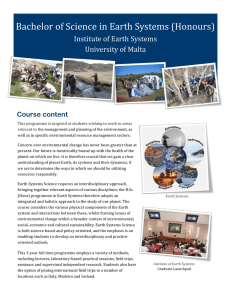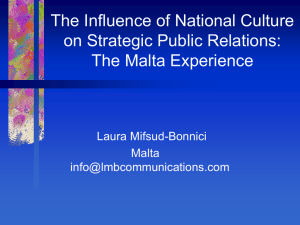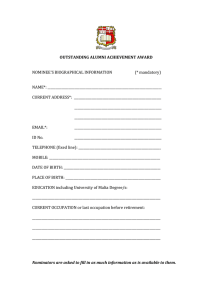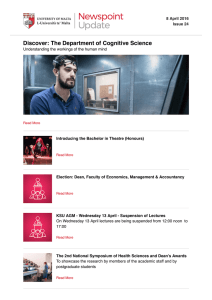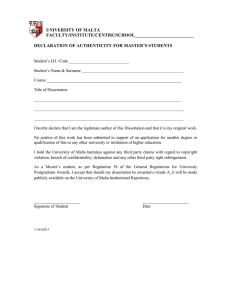2010
advertisement
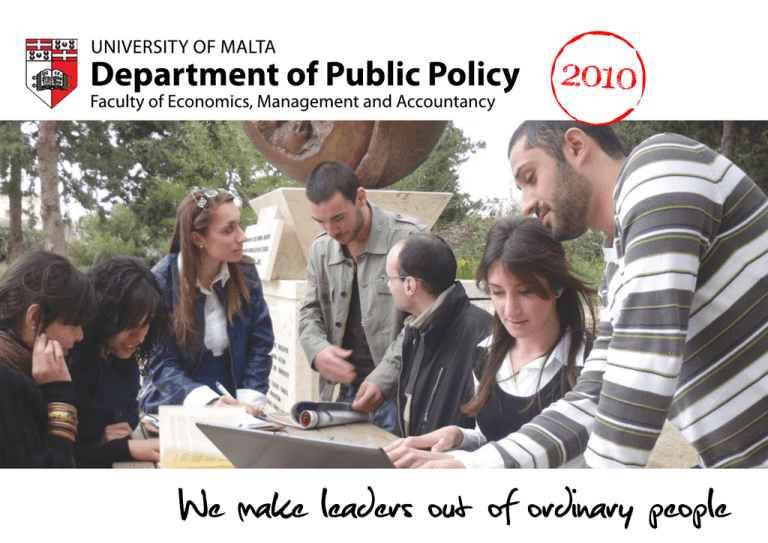
2010 Students’ Testimonials ‘A great study experience’ I would like to express my gratitude to the whole Public Policy Department for the precious advices with regards to both academic and personal life. All lecturers provided me with a great study experience. I am about to finish my M.Sc. in Business Studies at the University of Amsterdam this year and I would like to admit that the broader perspective and insight I gathered during my Public Policy lectures made me more perceptive and competitive. Contents Welcome to the Department of Public Policy 3 Denitsa Mitova International student Profile of the University of Malta 4 Profile of the Department of Public Policy 4 This course is for those who want to invest in their character and learn how to think. The disciplined but friendly and loving atmosphere in the Department of Public Policy totally changed me. From a reserved, shy person, I ended up doing an internship as a journalist, contested with success local elections, became active in politics and social life, got a job as a civil servant and now I am going to start my post-graduate degree in European Policy at one of the top universities in the UK. My trick to success is always using the same phrase.... ‘I studied public policy’! Our vision, mission and goals 5 Our diploma, undergraduate and postgraduate programmes 6 Core academic interests 9 Graduates’ and employers’ testimonials 10 Memorial lectures and public seminars 11 Joseph Vella Gozitan student Academic Staff 12 ‘Sincere gratitude to my lecturers’ From our departmental diary 14 I recall the time I used to wonder what public policy is and what it is all about. Since then, I graduated with an Honours Degree in Public Policy in 2006 and am presently half way to an M.A. in the same subject. I have been working as an Asylum Determination Officer at the Office of the Refugee Commissioner - a job which puts much of what I have learnt into practice. I owe my sincere gratitude to my lecturers who are exceptional, and whose encouragement and support have been vital in accomplishing my goals. Frequently Asked Questions 15 Contact details 16 ‘My trick to success’ Fiona Sayan Maltese student 2 Welcome to the Department of Public Policy. This brochure introduces you to our range of academic programmes, together with a broad overview on our philosophy and concerns. You are very welcome to find out more about the Department of Public Policy by visiting: www.um.edu.mt/fema/publicpolicy/ for more information about staff, dissertations, activities and news. Welcome to the Department of Public Policy! I t is a pleasure to invite you to meet the Department of Public Policy, its students and staff, as well as to read about the courses, research and public events which we organise. The Department strives ‘to make leaders out of ordinary people’. Our aim is to develop leaders for all aspects of public life – in every tier of government, in corporate affairs and in civil society. Public affairs are not simply the concern of politicians and civil servants. In today’s dynamic, inter-dependent world, individuals, families and communities confront challenging issues and powerful socio-economic forces that touch their lives intimately. Most people and entrepreneurs have an opinion about these and other public issues, but have no idea about how public affairs are shaped, how policies are made, what their rights and obligations are. This is where we come in. Through the Department’s degree and diploma programmes our students acquire a solid understanding of how public affairs are conducted, and how policy is made. They acquire the ability to think from first principles, to decide complex problems, to defend a brief, to undertake policy-oriented research, and to examine ethical and ‘good governance’ issues. They are formed as leaders who are visionary, practical, ethical and effective; skilled decision-makers and competent bridge-builders, who are capable of bringing about planned change while maintaining institutional stability. It is an exciting time to study and practise public policy! Though the world is changing in complex, bewildering ways, citizens, politicians, civil servants and company executives find new opportunities to shape policy. As a multi-disciplinary field of study, public policy gives a competitive advantage to our graduates. They work in a wide range of challenging settings. Many have risen to the highest levels in powerful government agencies. Others work in European institutions; in the diplomatic service; in regulatory bodies; in think-tanks, auditing and consulting partnerships; and in large commercial firms. Still others are leaders in NGOs; some are journalists; some have chosen political careers; others work on development projects in far-away countries such as Fiji and Ethiopia. Our graduates have also distinguished themselves in post-graduate studies up to doctoral level, in Malta and abroad. There is much more to Public Policy than excellent teaching and fine career prospects. The Department has become the focal point of a community of scholars and practitioners who are deeply engaged in shaping events at home and abroad, listening to and working with governments, universities, employers and NGOs. I hope that you will find much that will interest and challenge you in this brochure and that you too will discover the profound satisfaction of a career in public policy. Dr Edward Warrington Head of Department 3 Profiles Profile of the University of Malta T he University of Malta traces its origins to the founding of the Collegium Melitense by the Jesuits in 1592. In 1769, Grand Master Pinto established a ‘Pubblica Universitá di Studi Generali’. During the British period (1800-1964), the University’s statutes and regulations were modelled on those of universities in the United Kingdom. The present coat-of-arms and the motto ‘Ut Fructificemus Deo’ – That we may Profile of the Department of Public Policy T he Department of Public Policy forms part of the Faculty of Economics, Management and Accountancy (FEMA) at the University of Malta. Since its inception in 1978, the Department has been totally committed to the highest quality research, learning and service in the areas of policy formulation, survey research, organisational change and institutional design. The department cares for its students and provides them with support during the course and in advancing their careers. Students also find a strong element of accountability and staff are always willing to provide guidance and pastoral service. Our coursework marking scheme is open and transparent, so that students have a 4 means of knowing how their grades are arrived at. Our members of staff all come with years of professional experience in public and private sectors and continue to be engaged with the world outside campus. The Department of Public Policy is also proud of having established a memorandum of understanding with Competitive Malta Foundation on research on domestic competitiveness. This partnership with a leading think-tank is a reference point on policyrelated matters associated with making Malta a wealthier and wiser nation - a place investors can trust and a place where good ideas can be lent an attentive ear. bear fruit for the glory of God – were proposed in 1923 by the then Rector, Professor Sir Themistocles Zammit. The University is the highest academic institution of the state and is open to all those who have the requisite qualifications. There are over 10,000 students, including some 750 foreign/exchange students, following full or parttime degree and diploma courses, most of them run on the modular and credit system. Vision, Mission and Goals Our Vision To make leaders out of ordinary people. Our Mission To empower students and policy practitioners to take leadership positions by acquiring cuttingedge competences in the fields of public affairs, economic and social development through quality education, knowledge creation and research design. Our Goals • • • • To provide students, administrators, managers and others who participate in public affairs with challenging leadership development opportunities in private/public management and policy making. To equip under-graduate and post-graduate students of all ages with competences that will improve the quality of policy formulation and decision-making in governmental, non-governmental and business organisations, locally and abroad. To draw academia, business and government into mutually beneficial relationships that contribute to good governance, national competitiveness and social stability. To train future scholars and researchers who can contribute to the development of policy science. 5 Our Programmes Bachelor of Commerce majoring in Public Policy and any other major area of study offered by FEMA Three years full time Diploma in Political Studies Two years part-time evening course This diploma programme focuses on the dynamics of public life, the actors and the institutions of the contemporary polity. It gives an in-depth understanding of Malta’s political economy within the European Union. It provides an excellent opportunity to become familiar with the workings of Malta’s governing institutions: Parliament, the Judiciary, the Cabinet, Public Service and Local Councils. It explains the role of Parliamentary Committees, and of the scrutinising agencies such as the National Audit Office, the Ombudsman, and other authorities in securing good governance, as well as the part played by civil society. It is intended for: * Leaders of non-governmental organisations * Political activists * Mayors and local council staff * Writers, journalists and opinion leaders * Civil Servants Students are required to acquire 60 ECTS credits and to submit a long essay (5000 words) at the end of the programme. 6 In FEMA’s Bachelor of Commerce programme, students select two major areas of study during the second and third years of the course. Thus, students opting for Public Policy as one of their majors, choose another subject as major from the list of programme specialisations offered by FEMA. Currently, these are Accountancy, Management, Economics, Banking and Finance, Marketing and Insurance. The Public Policy major provides students with skills relevant for designing, managing and evaluating policies and programmes. With its emphasis on applying social science theory and methods to issues of strategy, development and organisational design, the Public Policy major is an excellent complement to a major in economics, banking and finance, or management. The course requires 180 ECTS credits of which 172 credits are compulsory and 8 credits are optional. Our programmes Bachelor of Commerce (Honours) in Public Policy One year full time, following the 3-year B.Com. programme The Honours year in Public Policy focuses on developing leaders for all aspects of public life – in every tier of government, in corporate affairs and civil society. The course is especially designed to take account of the distinctive characteristics of leadership in micro-states. Our graduates acquire, in the first place, a deep and broad understanding of how public affairs are conducted, and how policy is made in response to economic, environmental, fiscal, geographical, institutional and socio-cultural characteristics of a nation. Building on the foundations laid in the previous three years of public policy studies, students master the skills expected of policy analysts, project managers, mid-ranking executives, administrators, regulators, change managers and comparable positions. They acquire the ability to think from first principles, to decide complex problems, to defend a brief, to undertake policy-oriented research and to examine the ethical and ‘good governance’ implications of policy issues. The Honours programme requires 60 ECTS credits and a dissertation of 12,000 words. Master of Arts in Public Policy Three year part-time evening programme This programme is specifically designed to meet the needs of government officials in every tier of government, policy and strategy consultants, statutory regulators, political leaders and leaders of NGOs. It fosters the development of leaders who are both visionary and practical; skilled decision-makers and competent bridge-builders; ethical and effective; leaders who are capable of bringing about planned change while maintaining institutional stability. Our graduates acquire a thorough knowledge of governance and policy-making – its principles, its institutional forms and processes, its pitfalls and the state of the art in capacity-building and governance reform. They do this by participating in scholarly debate, by analysing real world scenarios and acquiring high-level research skills. The course is targeted to senior and mid-career officials working in government agencies, international institutions, large corporations in the public and private sectors, and in the not-for-profit sector. Local councillors and senior political party officials, together with young, capable scholars aspiring to careers in academia can also be potential participants. Doctor of Philosophy Three years full-time, Six years part-time The PhD programme offers doctoral students an intellectually charged, challenging environment in which to explore new ways of thinking about problems facing small states in a globalised world scenario. It offers an atmosphere of academic freedom rooted in a shared commitment to make the world a better place to live in. The programme is rigorous, but it takes pride in its philosophy that there are no preset fields of study or methods of research. Students, who may be full-time or part-time, are registered initially for the M.Phil qualification, with a decision as to upgrade to PhD status being taken within the first eighteen months of registration, subject to satisfactory completion of written work. The Doctorate of Philosophy programme requires a scholarly research dissertation of 90,000 words and the development of personal competencies, including research design and policy expertise. 7 ciety o s d n a e t a t s s, a d society• Id n a e e t d a t s eas •I , s a , de , state and society• I Ideas d e a et y s Ideas, stat , s • e a n iety d s soc Core academic interests Ideas, state and society c policy Sph i l b u p eres s of This core area of interest comprises the following issues of the recent past, the present and the likely shape of the future: • State failure and failed states – the Mediterranean region offers a rich field of experience and experimentation, as well as stagnation and failure • Under-governed areas of public life – outer space; the seas; climate; cyberspace • Balancing public interest and private life – the regulation of privacy and markets • Improving service delivery and the integrity of public services – public management, privatisation, accountability, anti-corruption, welfare reform • Small states and islands – distinctive characteristics, consequences for politics, government and public administration, capacity-building, patterns of governance. iety Ideas, state an d s o d soc c i e t e an deas, state and s y tat I o c i e t et y• y I oci Issues of goo dg f g o o s o e d gov Issu • er ce • Issues of good gov e nce r n a rna rnance ove • Issues of good e c n a gov n r e e s u o s v f go o e Is • of oIssues e c good d g n a n governance • The public square – now including civil society as well as ‘virtual’ squares such as the internet • Political thought – an area which is still evolving, and which could contribute immeasurably to future generations of Maltese leaders • Law – an area of renewed interest to economists, political scientists and governance specialists; the rule of law in securing good governance is our primary interest • Citizenship – an evolving idea, under the influence of migration, multi-culturalism, New Public Management and European integration. es of g od gov e r n • Issu a nce s of good gover nce n e a n Issu 8 Core academic interests and proc s n o i t es s ts itu ss es Instit s of p u f b o l s i c e r poli e h p cy S Leadership a nd m an e m n e t g • a L n e a ade m r d sh n a This field is exceptionally rich, offering numerous opportunities for the development of study programmes, professional development and research. It covers such issues as: • Leadership in public affairs, including the idea of leadership, biographical research, patterns of leadership in Maltese public life (political, social and commercial) • Leadership development – including career paths, qualities of leadership, professional conduct • Negotiation and conflict resolution • Maltese language skills for policy makers • Knowledge management • Public management at central, local and supra-national levels • NGO management • Project planning and management • Human resource development for competitive, transitional societies as well as for organisations. r nt ade ment • Leade • Le r s h n ag e ip ma • Sp publ eres of ic policy • Sph cy eres of public po Sp h l i c y he ership and m d a e L • t ana n e m ge agement n e a m g d a n a Leadership and ip management processe s s and • In ion nd p a r o c e ions The nation-state Sub-national government Multilateral institutions Supra-national government – the European Union is an astonishing innovation in the history of government, and a powerful player in contemporary policy-making • Civil society – Malta offers one of the most interesting and diverse forms of civil society, deeply rooted in Catholicism and in representative democracy. • Corporate governance • Cybergovernance • History of government and governing institutions • Constitutional studies and institutional design • Decision making, policy analysis and design • Regulation • Policy reform and organisational change. ership and man a g e Lead m e Lead nt nt • e r s h i p me a n d • Spheres of pub l i c olicy p ic p es of public po oli r l i e c y S ph This field covers matters traditionally identified with ‘public policy’, including: Our alumni can now be found in all of the following spheres of governance, which operate under a wide variety of regimes and interact intensively: • • • • ses proces • Inst nd s • Inst itut i t u t esse Institutio ns a se s and pro n Institutions o i c ut and processes S p heres o y c i l o p f pu ic l b f p o bl ublic s e r puSpheres e h of • Sp public policy 9 Graduates’ and Employers’ Testimonials Graduates’ Testimonials ‘Public Policy contributed significantly to my cross sectoral expertise’ Dr Leonard Mizzi European Commission Trade Negotiator I was at the University of Malta from 1984-89 and I consider that the academic staff from the Department of Public Policy have contributed significantly to my cross sectoral expertise. The knowledge acquired has also enabled me to gain confidence in dealing with civil society. I am a firm believer in outreaching to NGOs, especially in the development field, and – in my previous job – with trade unions and farmers’ organizations and other sectoral interest groups. Today, as a trade negotiator working within the European Commission (DG for Agriculture and Rural Development) and dealing specifically with the African, Caribbean and Pacific States and the UN bodies, in particular FAO, in the areas of agriculture and food security, I would safely state that the theory and methods acquired some 25 years ago, complementing the techniques attained during my post graduate studies some years later, proved to be very handy in my current job. ‘Dan il-kors bidilni’ Peppi Azzopardi Director - Xarabank, WEBA Għadni niftakar nara avviż li kien jirriklama kors universitarju fix-Xjenza Politika. Il-Politika nħobbha, iżda qatt ma xtaqt inkun politiku. Applikajt u mort l-ewwel laqgħa biex nifhem. Mill-ewwel qalulna li dan mhux kors għal dawk li riedu jsiru politiċi biss, anzi huwa kors għal dawk kollha li jixtiequ jimirħu fil-politika. L-entużjażmu li qabadni wara dik il-laqgħa baqa’ miegħi għas-sentejn li għamilt nagħmel il-kors. Ma niqafx ngħid kif dan il-kors biddilni, għax nistqarr li qabel kont ċert wisq minn ħafna affarijiet. F’dan il-kors tgħallimt nistaqsi, tgħallimt nara u niġġudika l-istorja fil-kuntest tagħha, fhimt mill-kors li fil-politika ma hemmx biss żewġ naħat iżda naħat infiniti. Il-politika mhix sterjow. Tgħallimt minn sħabi daqskemm tgħallimt mil-lekċerers. Id-diskussjonijiet li kien ikollna lanqas jibdew ma’ Xarabank! Nirrakkomandah. 10 Employers’ Testimonials ‘Their contribution... has been outstanding’ Dr Godwin Grima Principal Permanent Secretary Office of the Prime Minister Today, many of the leading positions in the Public Service are occupied by graduates in Public Policy and their contribution to economic and social development in Malta has been outstanding. The future development of Malta and membership of the European Union will continue to open up exciting opportunities for graduates of Public Policy ‘An invaluable asset’ Marietta Bartoletti Management Officer US Embassy Malta We selected Maria Cassar from a highly competitive group of applicants and she is now performing her duties as a Commercial Specialist at the US Embassy. Her Masters degree in Public Policy also influenced our hiring decision, and there is no doubt that the knowledge she gained pursuing that educational goal has served as an invaluable asset for her to better understand US government policy, the environment in which the US government operates and how US policy is implemented. ‘High-calibre, motivated team members’ Frank Spiteri Managing Director Gutenberg Press From the number of university graduates we employ, two of them, Nicolai Portelli and Blodwen Spiteri, are public policy specialists. Nicolai is currently furthering his studies and has embarked on an MBA programme. Both Nicolai and Blodwen have proven to be high-calibre, motivated team members in our expanding company and we would not hesitate to employ more public policy graduates if the need arises. Memorial lectures and public seminars 11 Academic Staff Mr Colin Borg B.Com. (Hons), M.A. (Public Policy) Mr Robert Micallef M.A., M.B.A., M.Sc, D.S.S. (Oxon) Colin joined the University of Malta as a member of staff in 2002 and currently forms part of the Academic Programmes Quality and Resources Unit. His main areas of interest concern public management and local governance. His prior experience at the Office of the Prime Minister where he was responsible for international bilateral programmes, EU funding, and the management of capital projects is a great asset for him and the Department alike. Robert’s main teaching and research interests are in the areas of government institutions, comparative government, policy making in small states and European policy. He is the academic co-ordinator of the political studies diploma programme run by the Department. Robert studied politics and economics at Oxford followed by graduate studies in Italy, France and the United States. He was a senior member of the EU delegation during the years of accession negotiations and later edited Eurobarometer surveys published by the Commission. Dr Emanuel Camilleri B.Bus. (Acc), Dip. Bus. (EDP), Dip. Bus (Acc), C.Eng., Eur. Ing, CPA, M.Phil, MBA, DBA, MBCS, CITP Ms Anne Marie Thake MSc. (HRD) (Manchester), B.A.(Hons) Public Admin. Prof Godfrey A Pirotta B.A. (Hons) (Pol.Sci) (R’dg), M.A. (Public Policy) (Bath), Ph.D. (Bath), D.S.S. (Oxon.), P.G.C.E. Godfrey’s academic interests lie in the direction of ideas and their relation to modern public policy, governance, public management and politics, institutional development, including local government, and the particular socio-economic and political circumstances of micro-states. Many of his works have been published both locally and abroad. He is currently the Director the Institute of Public Administration and Management and a visiting professor at a number of overseas universities in Europe and Australia. Dr Carmel Tabone O.P. S.Th.L., S.Th.Lic. (Ang.), Sc.Soc.D. (Ang.) Anne Marie has worked in public and private organisations, whilst still lecturing at the University of Malta. Her research interests include public sector management, human resource development, organisational strategy and gender issues. She is currently reading for a Ph.D. with the University of Bath and researching on the competencies and employment requirements in the public and private sectors. Dr Tabone is a senior lecturer in sociology and social policy. He is the author of several publication concerning Maltese families, religion and development. He has served as coordinator of the Mediterranean Social Sciences Network and editor of the Mediterranean Social Science Journal. Currently, he is the Deputy Chairperson of the National Family Commission and also responsible for the PR office of the Maltese Diocese. Mr Alfred Grixti B.Educ (Hons), D.S.S. (Oxon), M.Sc. (Oxon) Mr Mario Thomas Vassallo M.A. (European Studies), B.A. (Hons) Public Policy, B.Commerce, M.I.M. Prof Edward Zammit B.A. (Sociology), Ph.L. (Chicago), M.Lit, (Oxford), D.Phil. (Oxford) Alfred Grixti is a highly experienced lecturer, specialising in industrial relations, local government and public policy. His main areas of interest are employment and employee relations with a focus on job creation, employment data and trade union membership as well as the relationship between educational attainment and employment opportunities. Mario is at present pursuing doctoral studies in politics at the University of Sheffield wherein his research theme concerns the Europeanisation of interests groups and their role in domestic and European policy-making processes. Prior to his academic experience, Vassallo established a highly successful professional career in the field of HR and Training matters. He is an accredited proof-reader in Maltese language, and has produced and presented numerous radio programmes on national and community radio stations. Professor Zammit ‘s main research interests are broadly in the field of industrial sociology. Over the years, he has published and taught courses on work, organisational participation, human resource development and industrial relations. More recently, his interests also include the sociological aspects of tourism and leisure. Prior to his retirement from the Public Service, Emanuel occupied the post of Director General at the Ministry of Finance. Major corporate projects undertaken include the implementation of accrual accounting across Government Ministries, establishing the VAT Department and Tax Compliance Unit, and the integration of revenue earning departments within the Ministry of Finance. Dr Camilleri is currently in the process of finalising his latest publication: Project Success: Critical Factors and Behaviours. 12 Acad Sta Dr Edward Warrington B.A. (Hons) Public Admin., M.A. (Toronto), D.Phil (Oxon), A.C.I.S. (UK “As a former civil servant and, now an administrative consultant to th Archdiocese of Malta, I am interes in the governance of micro-states of large, traditional and trans-natio civil society associations such as th Catholic Church. I have supervised sertations on the Europeanisation as publishing studies in all three fi demic aff www.um.edu.mt/fema/publicpolicy Mr Adrian Dalli B.Com (Hons), M.Sc (Management & Public Policy) (London) Mr Godwin Mifsud B.Com (Hons) Economics, M.Sc (Economics) (Essex), M.A. (Public Policy) Adrian’s areas of interest encompass Human Resource Development, Methods of Public Financial Management, Decentralisation and Local Governance, Privatisation and Public/Private Partnerships and Information Systems. At present he is employed as a Programme Manager within the Office of the Permanent Secretary in the Office of the Prime Minister. Previously he undertook duties within the Ministry for Economic Services and the Ministry of Finance. “I am Senior Economist at the Ministry of Finance, the Economy and Investment and my main research interests include the economics of ageing and welfare state reform, the sustainability of public finances and the relationship between institutions and budget performance.” Mr Alfred Camilleri B.A. (Hons) Pub Adm, M.Sc (Econ) Dr Helena Dalli MP BA.(Hons)., MPhil.,PhD. Ms Amanda Salib B.Com (Hons), MA Public Policy Alfred occupied various managerial positions within the public service. He was instrumental in the restructuring of Malta’s national statistics service by setting up the NSO and by widening the coverage and depth of the national statistical services. He was appointed Census Office for the 1995 and the 2005 national census rounds. In 2006, Alfred was appointed Permanent Secretary at the Ministry of Finance, a position which he still holds. He is Malta’s representative on the Economic and Financial Committee of the EU. “My research interests are in governance, power and public policy. While my academic background is in political, legal and economic sociology, my hands-on experience in politics directly linked to decisionmaking is my immediate contact with people’s lives”. “I am particularly interested in the role of small states in the international arena, especially the small states of Europe. I am enticed by the intermingled and unique political, economic, social and environmental conditions of small states. Though burdened with a number of constraints, my research directed me to look at small states as affluent and prosperous players in international affairs. Small is beautiful!” Mr Vince Caruana B.Ed (Hons), M.Sc (Env. & Dev. Educ.) (London), Dip. Political Studies Ms Rebecca Gatt B.A. (Hons.) Sociology, M.A. (HRM & Ind. Rel.) (Keele) Mr Louis Xuereb D.P.S., B.Sc.Econ.(Hons)(Lond.), M.A.(Pub.Pol.) Vince is currently a part-time PhD student with the University of Malta focusing on Education for Sustainability within the Adult, Youth and community Sector. Vince is very active in developing the local NGO scenario and is a founding member of Koperattiva Kummerċ Ġust and Kopin (Koperazzjoni Internazzjonali – Malta), and currently chairs SKOP – the Maltese National NGDO Platform. Rebecca’s main areas of interest are in sociology of work, political sociology, social policy, the employer-employee relations, collective bargaining and negotiations. In 2009, she started reading for a Doctor of Philosophy at The Centre for Labour Market Studies, University of Leicester, United Kingdom. “Public Policy interests me because it deals with everyday issues. It concerns every aspect of life. I have special interest in foreign, social and health policies, which certainly create ample room for further study and debate”. Ms Maria Brown M.A. (Sociology), B.A. (Sociology & Italian) Maria is currently a Research Assistant working on an EU Project concerning social cohesion and education, and lectures with various departments and institutes. She is pursuing her studies at doctoral level with a dissertation on empowerment attached to parental involvement in primary schools. Her research interests include employment, education, vulnerable groups, social capital, social policy and the EU. Forthcoming publications include findings of an empirical research on youth unemployment and a paper on interactive groups in education. K) w he sted s and onal he d disn of public administration, as well fields.” 13 www.um.edu.mt/fema/publicpolicy From our Departmental diary Dr Carmel Tabone OP during one of the lectures on Family Policy in a Changing Socio-economic Environment First year Public Policy students during one of the orientation lectures delivered by Ms. Stephania Sant, guest speaker On-site lecture at the Archbishop’s Curia in Floriana, wherein the Catholic Church served as a case study of a local institution involved in policy making A nightout at the Valletta Waterfront that brought together our third year Public Policy students and a number of academic staff Academic and administrative members of staff during dinner in honour of Prof Godfrey Pirotta who has retired from the headship of the Department in 2009 Prof Pirotta during a cheerful moment whilst exchanging best wishes with the rest of the Departmental staff An on-site lecture at the National Archives in Rabat as part of the study unit encompassing research methodologies and academic writing First year students with Ms Anne Marie Thake during a familiarisation visit at the Malta Stock Exchange in Valletta Dr Julian Vassallo, Head of the European Parliament Office in Malta, and Mr Alfred Grixti together with a group of Public Policy students at Dar l-Ewropa in Valletta 14 www.um.edu.mt/fema/publicpolicy Frequently Asked Questions I want a good job. Why should I study public policy? Public policy offers graduates of the department great opportunities to quickly take up leadership positions in both the public and the private sector. Employers want graduates with skills that are not merely mechanical but able to identify challenges and opportunities as early as possible. Public policy will give you these skills because it educates in a holistic manner. Our graduates are sought after by employers in the public service and in industry precisely because they are proactive. Our graduates can also be found at the Bank of England, the European Commission and its related institutions and international NGOs. Furthermore, our courses are constructed in a way which prepares students to further studies at post-graduate studies. Our department boasts the highest number of Ph.D graduates in the Faculty. Versatility is the key to a successful career. Versatility is what we give you. Can I enrol on a part-time or full-time basis? Currently, enrolment in the Bachelor of Commerce degree majoring in Public Policy, including the Honours programme, is only available on a full-time basis. In the case of both the Diploma in Political Studies and the Master of Arts in Public Policy, courses are only available on a part-time basis. Are any tuition costs involved? In respect of Maltese and EU citizens, no tuition fees are levied for the Bachelor of Commerce degree majoring in Public Policy, including the Honours programme.Tuition fees are charged for the Diploma in Political Studies, Masters and Doctorate courses in Public Policy. Information about fees can be obtained from the Admissions Office website: admissions@um.edu.mt in the case of Maltese applicants and from the International Office for international applicants. NonEU applicants are required to pay tuition fees established by the University of Malta. NonMaltese applicants must register their intention to study at the University of Malta with the International Office website: inteu@um.edu.mt. This is the only office that can advise applicants on such matters and can help them to acquire VISAs (when required) to study in Malta. How do I apply? Applications for courses starting in October of each year are normally received during the first weeks of July. The application process is advertised in local newspapers and on the University website. The University also receives applications online. For further information, contact the Admissions Office on: admissions@um.edu.mt. Applications from international students are normally received in March and April. Further information can be obtained from the International Office on: int-eu@um.edu.mt. Are there any pre-requisites for admission? For Maltese applicants, the University has established minimum entry qualifications for the course leading to the Bachelor of Commerce degree majoring in Public Policy. Applicants must be in possession of an Awarded Matsec Certificate, including an intermediate level pass at grade E or better in Pure Mathematics. Applicants who lack a pass in the latter subject will be admitted on the proviso that they will satisfy special conditions within the course. The Master of Arts in Public Policy is open to applicants in possession of: (a) a Bachelor degree obtained with at least Second Class Honours in Public Policy or in related areas; or (b) an Honours degree in Public Policy classified as Third Class provided that they have obtained other qualifications, including relevant experience. Applicants for the Diploma in Political Studies must be in possession of the Awarded Matsec Certificate as stipulated in the Admission Regulations of the University. What are the admission prerequisites for mature and international students? For each of our courses, students who are deemed mature by the University regulations and who do not possess the required academic qualfications may also be admitted if they satisfy the Admissions Board that they can pursue their studies with profit. International students must contact the International Office on: int-eu@um.edu.mt. For further details on this matter. What can I expect if I join one of the courses organised by the Department of Public Policy? In the first instance, academics who themselves are recognised leaders in their field and in Maltese society. Second, a learning environment which allows for the widest possible level of academic freedom and debate. Third, transparent and accountable processes which give students the peace of mind necessary for academic and human development. Whom should I contact to obtain more information? For queries concerning academic issues arising from our academic programmes, kindly contact Ms. Amanda Bartolo on publicpolicy.fema@ um.edu.mt or by phoning 2340 3358. For all other queries, kindly contact the appropriate offices (Admissions Office and the International Office). Further information can be obtained from the University website: www.um.edu.mt Ms. Amanda Bartolo Executive Officer Department of Public Policy 15
